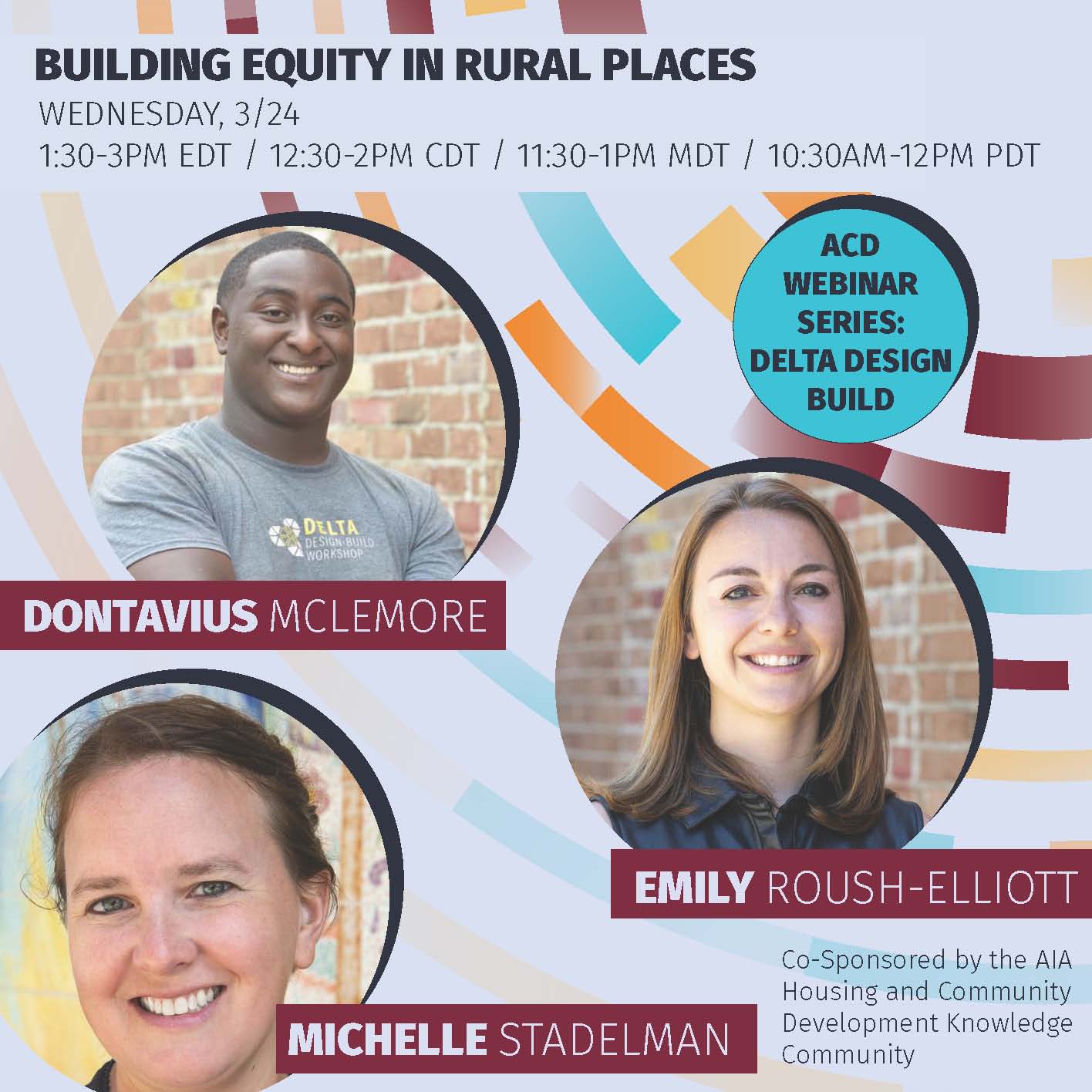
Building Equity in Rural Places
Emily Roush-Elliott, Michelle Stadelman & Dontavius Mclemore - Delta Design Build Workshop, Greenwood
Wednesday, March 24th
1:30pm - 3:00pm EST / 10:30am - 12:00pm PST
Co-sponsored by the AIA Housing and Community Development Knowledge Committee
In towns throughout the Mississippi Delta, systemic disinvestment has resulted in a state of persistent poverty where many low-wealth people live in homes that are over 40 years old, unhealthy, and expensive due to high utility costs. Innovation is needed to realize housing opportunities that meet the needs of residents, support wealth-building, and are scalable within the regional context. The Delta Design Build Workshop (Delta DB) has been working near Moorhead, Mississippi alongside the Eastmoor Resident’s Association and Hope Enterprise Corporation since 2016, to respond to challenges the neighborhood has faced as a result of predatory development practices and structural, sometimes racially discriminatory, disinvestment. As a component of this work, some of the homes that were in severe states of disrepair (at no fault of the former renters who had recently become owner-occupants) are being replaced with new homes. This is something that can be found and finally, maybe seen, throughout the county and not unique to Eastmoor, Moorhead, or Mississippi.
Millions of Americans are currently destabilized because of the gap between the cost of housing and household income. This fact (and the resulting financial, social, and physical and mental health ramifications) is made clear through countless research efforts and media reports that span the political spectrum. Delta DB created two research documents over the past year: Rural Housing Context and Potential Through the Lens of the Mississippi Delta and 7 Ways to Design Housing That Builds Equity for Rural People and Places. These documents are not an attempt to prove the need for housing that is affordable. Instead, this research effort analyzes national scale rules and regulations, the rural setting, and local context to develop a framework for multivalent housing-related responses that balance optimism and pragmatism. The innovations and resources within these documents will be pertinent to a diverse audience, including small municipalities, financial institutions, designers, developers, residential builders, and homeowners.
As a caveat to this proposal is the assertion that the players involved in producing housing at these affordability levels need not be non-profit organizations but must approach the effort with more than the financial bottom line in mind. Introducing non-monetary values into the decision-making metrics of each field is increasingly necessary as the global population expands and environmental resources are depleted. The positive impacts of this love-and-kindness approach to business are abundant and cyclical. Delta DB is managed based on these principles. The session will focus on the lessons learned from the approaches taken in the research and the implementation of affordable housing in the Mississippi Delta. While a series of toolkits and strategies have been developed and tested, the work is not intended to be a set cookie-cutter answer for all rural communities or all affordable housing. The session’s intent is to add to the conversation among those striving to develop scalable, equitable strategies for affordable housing design, construction, and financing. This information will create a “feed-forward” process to improve the designs and project delivery methods deployed by Delta DB and will provide a framework for organizations throughout the country to apply to healthy, affordable housing efforts in their unique contexts.
Learning Objectives:
- The session works to demonstrate health outcomes impacted through the design and construction; it illuminates decisions and best practices that contribute towards sustainable and economical solutions.
- As we discuss the link between Energy and Dollars, we develop a strategy for evaluating and translating technology into practical applications for rural housing.
- The session is framed on describing health inequity of existing homes and assess practical solutions to be applied immediately and in the long term.
- The approach to research and resource development from this work employs a number of ways to dispense pertinent information to diverse audiences.
Speaker Bios:
Emily Roush-Elliott is a social impact architect and a recent alumna of the Enterprise Rose Architectural Fellowship during which she was hosted by the Greenwood-Leflore-Carroll Economic Development Foundation and the Carl Small Town Center, and managed the Baptist Town Neighborhood Reinvestment project. She is a registered architect in Mississippi and Ohio, and a LEED AP. She holds a Bachelor of Science in Design from Arizona State University and a Master of Architecture from the University of Cincinnati. Since 2010 she has worked with Village Life Outreach Project in Tanzania, contributing to the designs and leading construction of the Roche Health Center and Burere School projects during graduate school. Emily first became interested in socially impactful architecture during a study abroad in Buenos Aires, Argentina in 2006. Her interest solidified into a career path while rebuilding homes destroyed by Hurricane Katrina with Hands on Gulf Coast and the Gulf Coast Community Design Studio in Biloxi, Mississippi.
Michelle Stadelman is an architectural designer who came to the Delta through the Enterprise Rose Architectural Fellowship. She holds a Bachelor of Science in Architecture from the University of Minnesota and a Master of Architecture from Boston Architectural College. She has worked for more than a decade throughout the U.S. and Rwanda with a deep portfolio of experience in sustainability, new building construction, historic preservation, retail design, commercial interiors, and furniture design. She has experience in both traditional and non-traditional architectural and educator roles, bringing a wide skill set focused on meaningful results.
Dontavius Mclemore is a Construction Specialist and an alumnus of the Leflore Energy Efficiency Apprentice Program (LEAP), a job training program developed by Delta Design Build in partnership with HUD. Dontavius started working with Delta DB during the Eastmoor Playground project in August 2017. An aspiring architect, Dontavius enjoys the hands-on learning experience and the variety of locations he works on with Delta Design Build. Dontavius was born and raised in Greenwood, MS.
| Donate to Support ACD |
|
Events Fields
|